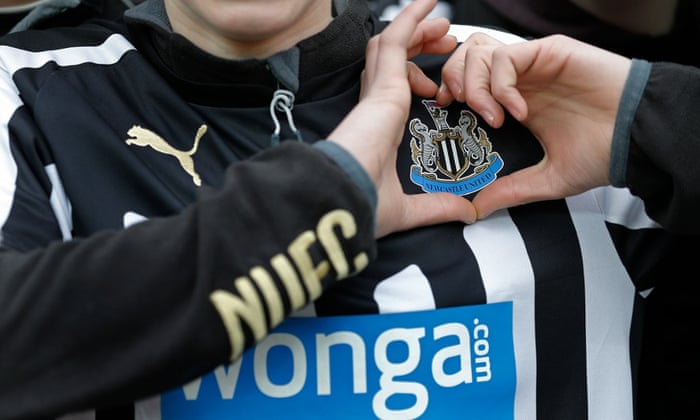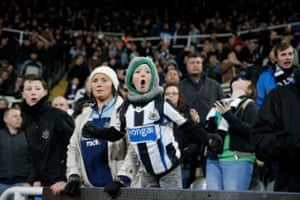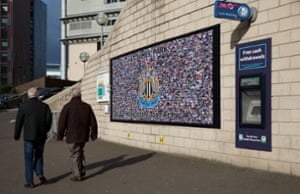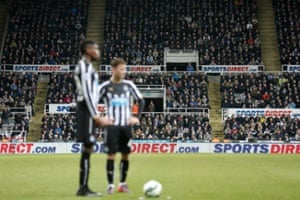
Newcastle, in 12th place, should feel by contrast like a northern rock of stability, clear of real relegation worries, 50,000 crowds still stocking the yawning stands of St James’ Park to watch the fabled black and white shirts of a grand English football club. The caretaker coach, John Carver, will take a reasonably competent team of mostly frugal signings to Sunderland aiming to win but among the fans in the stands there is widespread disenchantment with the club’s character under the owner, Mike Ashley, founder of the no-frills retail behemoth Sports Direct. With a stated football aim of finishing 10th or higher, and cups not a priority, there is a draining of spirit. Michael Martin, a supporters’ trust board member and editor of the True Faith fanzine, sadly describes Newcastle now as “a zombie club, half alive, half dead, going nowhere”.
This week Newcastle announced an £18.7m profit for 2013-14 – lower than expected – a financial performance hailed by the managing director, Lee Charnley, as “positive”, reflecting “the prudent and measured manner in which we operate”.
Yet prudent and measured are not principles to stir the hearts of fans in the one-club city which harbours hopes of greatness. Newcastle still radiates tales of four league championships won early last century, three gleaming FA Cups held aloft in the 1950s,the tradition of hero No9s, epitomised by “Wor” Jackie Milburn and continued by Alan Shearer until his retirement nine years ago. Ashley’s recruitment policy now seeks young players not envisaged to serve for years into geordie legend status but who will instead use the club as a platform for a lucrative move to a bigger status club elsewhere. That the stadium is splattered with adverts for Sports Direct, payday lender Wonga sponsoring the shirts and billboards, frames a cheapskate feel.
“Apathy will kill Newcastle United and the club is drenched in it,” Martin says. “People are concerned about the atmosphere at St James’ Park; it’s appalling. Ashley has got us in this kind of zombie state.”
David Conn travels to Tyneside to meet Michael Martin, former chairman Freddy Shepherd and council leader Nick Forbes, discussing Mike Ashley’s stewardship of Newcastle United.
http://multimedia.guardianapis.com/interactivevideos/video.php?octopusid=10210972&format=video/mp4
Following Ashley’s good-time Charlie early period in charge, and the debts he inherited from Newcastle’s first cavalier gallops into the Premier League era, he has settled a pared-down formula on the football club. In the absence of public communication from Ashley, who has given scant interviews over the years since opening his first sports shop in Maidenhead in 1982, the pillars of this Newcastle system have been explained by Charnley and the previous managing director Derek Llambias.
Based on a realist’s assessment of English football’s financial structure, Ashley’s strategy is to remain safely within the Premier League’s golden windfalls, while accepting the club cannot compete with the commercial machines of Manchester United and Arsenal, the oil-backed mega-wealth of Chelsea and Manchester City, and Tottenham Hotspur and Liverpool, who comprehensively out-earn Newcastle. That reckoning resulted in Charnley spelling out to a fans’ forum that Newcastle’s minimum target is to finish 10th, which has lodged in many supporters’ minds – unfairly, the club feels – as a satisfaction with being mid-table and profitable.
The firm smack of 21st-century realities was compounded by Charnley saying competing in the cups was not a priority because it requires a depth of first-team squad without which a cup run can threaten Premier League survival. It is thought Alan Pardew strained relations with his employers by fielding strong teams in the Europa League knockout rounds in 2012-13, which they believed contributed to the club finishing 16th in the Premier League after fifth the previous season.
So, fans bred on black-and-white images of glory feel Ashley will not even try to replicate the famous day at Wembley on 7 May 1955 when a grizzled captain, Jimmy Scoular, lifted the FA Cup after a 3-1 victory over Manchester City, Newcastle’s last domestic trophy, ticking round to 60 years ago.
The policy for player recruitment is well known: the chief scout, Graham Carr, sifting French, Dutch and Spanish football for promising talent aged under 25, who can attract good notices at Newcastle and be sold at a profit to a Champions League club.
In 2011 this looked a suddenly brilliant formula, Ashley transforming his football reputation by wringing a barely believable £35m for Andy Carroll from Liverpool’s new American owners, and signing Cheick Tioté, Hatem Ben Arfa, Yohan Cabaye, Davide Santon and Papiss Cissé for a combined £11m less. Yet now, with Cabaye gone to Paris Saint-Germain, Ben Arfa released, Tioté injured, Santon on loan at Internazionale and Cissé – currently suspended for spitting – playing as a lone striker and with little comparable class around him, it looks a one-off. Ashley’s feels to many like a trader’s approach, at odds with the craving for club loyalists and heroes, around which Newcastle’s supporters have always rallied.
The club argues it is taking too much criticism and the Ashley regime is given too little credit for propping Newcastle on to sound foundations from which progress can be made – investment is promised this summer. Yet Shearer himself has spoken out about a “lack of hope” at the club he supported as a boy and spearheaded as a centre-forward for 10 years and 404 matches. Various fans’ groups met this week’s profit announcement with cynicism and a sour belief that making money, not achieving football glory, represents the measure of success for Ashley.
Relations with Newcastle city council are starkly chill compared with other northern cities, where football clubs and local authorities tend to foster partnerships for recognised mutual benefits. In Newcastle, although the club is working with the council on hosting matches for this year’s Rugby World Cup and contributes community work through its foundation, the council leader, Nick Forbes, bemoans a lack of general engagement. He remembers “a huge outcry” in the city when St James’ Park was renamed the Sports Direct Arena in 2011, a violation the fans still consider emblematic, despite the contorted PR of being told Wonga paid the following year to have the historic name restored.
Typically of Ashley’s regime, the renaming was done with no frills: the old St James’ Park sign was simply crowbarred off. The council’s vote to oppose the renaming brought Llambias storming down to the civic centre offices. “Before I had even got out of my chair his finger was jabbing in my face,” Forbes recalls. “He said: ‘Who the fucking hell do you think you are?’ I have to say I was taken aback.”
The club does believe the council has no place interfering in its commercial decisions, and argues it brings money, tourism and profile to Newcastle. Llambias always maintained the rationale was for Ashley’s own company to take the outrage for renaming the stadium, opening the possibility for a naming rights partner who would pay.
Forbes tells the Guardian he is “very angry” Newcastle’s flagship club has its shirts advertising Wonga, and describes as “toxic” the combination with Sports Direct, which now infamously employs 14,700 of its 19,000 UK staff on zero-hours contracts and the minimum wage, with incentives.
“Football is a religion here,” says Forbes. “People feel a fierce sense of passionate loyalty to the club. Yet they don’t see that being matched by the way it is run. The fans have a sense of anger, that they are being taken for granted as a cash cow, to support a commercial enterprise.”
Ashley has never displayed a sense of duty to explain to the Newcastle supporters why he bought their club in May 2007, or his various actions since. His approach went through two distinct phases before the present rigidly-controlled regime which seems to reflect his true incarnation. At first, with £929m banked from selling 43% of Sports Direct when it floated, it seemed to be a trophy purchase, away from his business preoccupations. He did do an interview with the News of the World then, in which he said: “I want to have fun and win some trophies.”
Home fans in the Gallowgate End. Photograph: Tom Jenkins for the Guardian
His drinking with fans and apparently slapdash approach ended in ordure and a furious backlash after the manager Kevin Keegan stormed away in September 2008 from his third spell as a Newcastle icon, then the hideous relegation under Shearer, who failed to halt the slide under Keegan’s replacement, Joe Kinnear.
Ashley promised to sell and leave then but when no solid offers arrived and he was left holding the club, he and Llambias gradually transformed the approach into its current character, more closely aligned with the Sports Direct machine. “It stopped being fun; the days of drinking with the fans are 100% over,” says one person who knows Ashley’s Newcastle attitude well. “Now, it is about business.”
Following Ashley’s lead of barely talking to the press – which seems to overlap into disdain, although he employs an agency to handle his personal public relations and another for Sports Direct – those close to Ashley tend to avoid talking about him on the record.
A stripped-down version of his attitude, without the early fun, can perhaps be seen inhis dealings at Glasgow Rangers. After the old Rangers went into liquidation and were started again with a new company in the Scottish third division, Ashley agreed to buy a minority 8.92% stake, around the same time securing for Sports Direct 49% of the club’s retail profits in a joint venture, and the naming rights on Ibrox. Sports Direct last year returned the naming rights option in return for consolidating marketing arrangements, understood to involve a significant portion of advertising hoardings, then increased its share of the retail to 75%, in return for an interest-free £5m loan.

Some who know Ashley shrug at that perception. Although said to be jovial and amiable to those he mixes with at work and socially, he is described as being obsessively dedicated, in business, to making money and coming out on top. Usually scruffy, dressed in jeans and a cheap Sports Direct hoodie, or a tie slung around his neck with top button undone, Ashley was serially underrated for years while building up the company.
Even retail consultants who admire Ashley for being self-made and triumphantly successful, such as Richard Hyman, of the Richard Talks Retail website, describe Sports Direct as, at its core, a “pile it high, sell it cheap” operation.
The Sports Direct chairman, the former police chief constable Keith Hellawell, in his bruising inquisition last week by parliament’s Scottish affairs select committee, objected to that characterisation, and the company points to its Oxford Street store for a rebuttal of it. But Hellawell did say of the company’s strategy: “We endeavour to sell product to the market as cheap, or cheaper, than anyone else.”
The committee had called for Ashley himself to appear, to explain the endemic employment of people on zero-hours contracts and the administration of a subsidiary, USC, in which 83 workers at a warehouse in Dundonald were sacked in January having been given only 15 minutes’ notice. Sports Direct had removed its stock from the warehouse and bought USC assets back from administration in a “pre-pack” deal, leaving suppliers owed £50m, £575,000 in unpaid taxes and, according to the committee chair, Ian Davidson, the taxpayer “shafted” to meet the workers’ redundancy costs.
Ashley’s lawyers, the committee reported, had said Ashley was “unavailable in March”, and Hellawell appeared instead, pressed into a series of admissions. Sports Direct had withheld rent to the warehouse landlord and payments to the clothing brand Diesel, to gain an advantage in negotiations, which Davidson described as “reprehensible practices”, while the Conservative MP Simon Reevell said the actions made Sports Direct look “like some sort of backstreet outfit”.

In its most recent, 2013-14 accounts, Sports Direct declared total income of £2.7bn, and the company made a pre-tax profit of £239m. Having swallowed or seen off most of his competitors – JJB went bust in 2012 – Ashley is no longer underrated; he is recognised and feared as a dominant figure on the British high street. Despite the jumble sale air of some of his shops and increasing criticism of his operation’s ruthlessness, he is repeatedly described as a strategic and operational genius.
A newly-made billionaire in 2007, he famously bought Newcastle in two days – seemingly, in part, an impulse buy. The club was majority owned by Sir John Hall, the Tyneside property developer, and Freddy Shepherd, who runs his Shepherd Offshore industrial company with his brother, Bruce. They had inspired revivalist fervour at Newcastle after promotion in 1993 into the new breakaway Premier League and Sky TV multimillions, appointing Keegan, who had spirited the club to promotion as player in 1984, as manager for the new era. “The supporters like stardust,” Shepherd says, “they like big-time managers and players.”
The football awakening was accompanied by rhetoric from Hall about an arising for “the geordie nation”, in which the club would lead regeneration of the region from the ashes of coal and death of shipbuilding. Michael Martin, steeped in the history of the club and area, says he felt at the time they were being dazzled but there was something knowing and truly seductive about the vision.
Newcastle United: the community club. David Conn talks with Michael Martin, former chairman Freddy Shepherd and council leader Nick Forbes.
In 1996 they brought back Shearer, signed for £15m from Blackburn, a statement that geordie talent would be retained, no longer sold, a signing deliriously acclaimed by thousands gathered at St James’ Park. Keegan, famously, saw a 12-point lead at the top of the Premier League wither to Sir Alex Ferguson’s Manchester United in 1996, and Newcastle’s thrilling team, featuring Shearer, Peter Beardsley, Les Ferdinand and David Ginola, finished runners-up as well under Kenny Dalglish in 1997.
The financial difference between Newcastle and other major clubs was not so pronounced as now, although the £47m raised by floating the club in April 1997 was used largely to pay off debts including from the Shearer signing. The St James’ Park rebuilding, done expertly to 52,000 capacity, was Hall’s and Shepherd’s more solid legacy.
Gradually, more strongly after Roman Abramovich began to pump £1bn of his Russian oligarch’s bounty into Chelsea, Newcastle nevertheless found themselves a financial level below the top clubs. They continued to find money for players including for the manager Sir Bobby Robson in the 1999-2004 sunset of his brilliant career but the signings were often disappointing, most notably the £16m Michael Owen, who made only 65 starts in four seasons before leaving in 2009 on a free transfer to Manchester United.
 A mural of Newcastle United fans on a wall at St James’ Park, which was paid for by Wonga and unveiled in 2014. Photograph: Tom Jenkins for the Guardian
A mural of Newcastle United fans on a wall at St James’ Park, which was paid for by Wonga and unveiled in 2014. Photograph: Tom Jenkins for the Guardian
Shepherd still says the club was not over-borrowed or struggling financially, and he never wanted to sell but Hall argued the club could not compete with billionaire backers. He had already made £20.35m from selling some of the family stake, and agreed to sell Ashley the rest for £55m – Premier League football making unprecedented profits for owners of clubs. Shepherd was in hospital with pneumonia; otherwise he argues he would have sought to raise the money and stay in control but eventually he and Bruce sold too, making £38m.
Ashley, the story goes, recounted in Michael Walker’s excellent book about north-east football, Up There, did not do due diligence before agreeing the deal. He said in his News of the World interview that after the Sports Direct float, he knew he would become more public, so decided to do something he had always wanted: buy a football club.
The club Ashley took over had income of £87m, a wage bill of £62m and had in 2006-07 made a £34m loss. Manchester United’s income, by comparison, was £212m; Chelsea’s wage bill was £133m. Newcastle had finished 13th under their manager Glenn Roeder, with players including Scott Parker, Charles N’Zogbia and James Milner.
The club had borrowings of £79m, at interest rates of up to 10.4%, owed millions in future instalments on player signings and no training ground to call its own.
Ashley immediately put in £75m as an interest-free loan, then increased it and it still stands, according to Charnley this week, at £129m. Unlike Hall and Shepherd, he takes no salary or dividend from the club, although he has the Sports Direct advertising, for which the company is understood not to pay.
 Putting his money in, drinking with fans, sacking the unpopular Sam Allardyce and bringing Keegan back in January 2008 for a twinkle of the old stardust form the long-ago memories of Ashley’s Tyneside honeymoon. The tribunal judgment awarding Keegan £2m for constructive dismissal is one reminder of why it ended. The tribunal found that Dennis Wise, appointed by Ashley as director of football, had urged on Keegan the signing of a Uruguayan midfielder, Ignacio González, whom nobody at the club had ever seen play – and who would not play a game for Newcastle but cost around £1m in wages. The club did so, the tribunal stated, as a favour to two South American agents “who would look favourably on the club in the future”. Such conduct of transfer business is simply inconceivable at St James’ Park now.
Putting his money in, drinking with fans, sacking the unpopular Sam Allardyce and bringing Keegan back in January 2008 for a twinkle of the old stardust form the long-ago memories of Ashley’s Tyneside honeymoon. The tribunal judgment awarding Keegan £2m for constructive dismissal is one reminder of why it ended. The tribunal found that Dennis Wise, appointed by Ashley as director of football, had urged on Keegan the signing of a Uruguayan midfielder, Ignacio González, whom nobody at the club had ever seen play – and who would not play a game for Newcastle but cost around £1m in wages. The club did so, the tribunal stated, as a favour to two South American agents “who would look favourably on the club in the future”. Such conduct of transfer business is simply inconceivable at St James’ Park now.
Llambias had been suspected as another capo in Ashley’s “cockney mafia” when he arrived in 2008, having previously run the Les Ambassadeurs casino on Park Lane and Fifty, a Mayfair casino club where Ashley liked to gamble.
However, Llambias stayed after the turmoil of relegation in 2009 and Ashley’s unfulfilled promise to sell, proving himself a forensic cutter of costs, gripping the financial operation and the new system in which Carr scouts for shrewd signings abroad – all of whom he will watch.
In May 2012, when Newcastle under Pardew finished fifth, the revised formula seemed to have flowered. They then revealed another layer of the thickest skin by unveiling Wonga, purveyors of payday loans at 5,853% APR, as the sponsor. The restoration of St James’ Park to its rightful name did little to offset the backlash. Forbes explains he was so angry because the council sees the social damage wreaked by unpayable debt, at advice centres which keep a stock of food because some Newcastle people come in with no money to feed themselves.
The club remains far from apologetic: Wonga, at £7m a year, is said to have offered by far the most money of any potential sponsor, and that was the yardstick. Charnley specifically name-checked Wonga in his comments about the club’s £130m turnover and £18.7m profit this week, saying: “The deals we struck with our two main sponsors, Wonga and Puma, together with a stronger focus on our commercial operations, have helped us achieve this growth.”
 At St James’ Park on a matchday, 50,000 people still gather, yet somehow a part of the reborn club feels absent. In Up There, Walker counted from one side of the stadium 137 Sports Direct signs. When the LED advertising boards flip to display the Wonga logo right around the pitch it is, truly, one of modern football’s most depressing sights.
At St James’ Park on a matchday, 50,000 people still gather, yet somehow a part of the reborn club feels absent. In Up There, Walker counted from one side of the stadium 137 Sports Direct signs. When the LED advertising boards flip to display the Wonga logo right around the pitch it is, truly, one of modern football’s most depressing sights.
Martin compares Newcastle to some other great sporting names Sports Direct has bought, such as Slazenger, Lonsdale and Everlast, evoking heritage and quality, yet which seem unloved and cheap in the shops, among the racks of gear festooned with discount tags. “The club feels like something which used to be good,” Martin says, “it has the original label but isn’t genuinely the thing it used to be.”
The club would argue this is unfair, that Sunderland’s present relegation danger shows how much worse things could be, that they have worked hard to run the club on sound policies and plan to make progress.
Yet football is a game of hopes and dreams, heroes and memories, not a mere exercise in financial soundness. Newcastle United, one of England’s grandest clubs, does not feel right as a billboard for a company dedicated to cheapness.

































